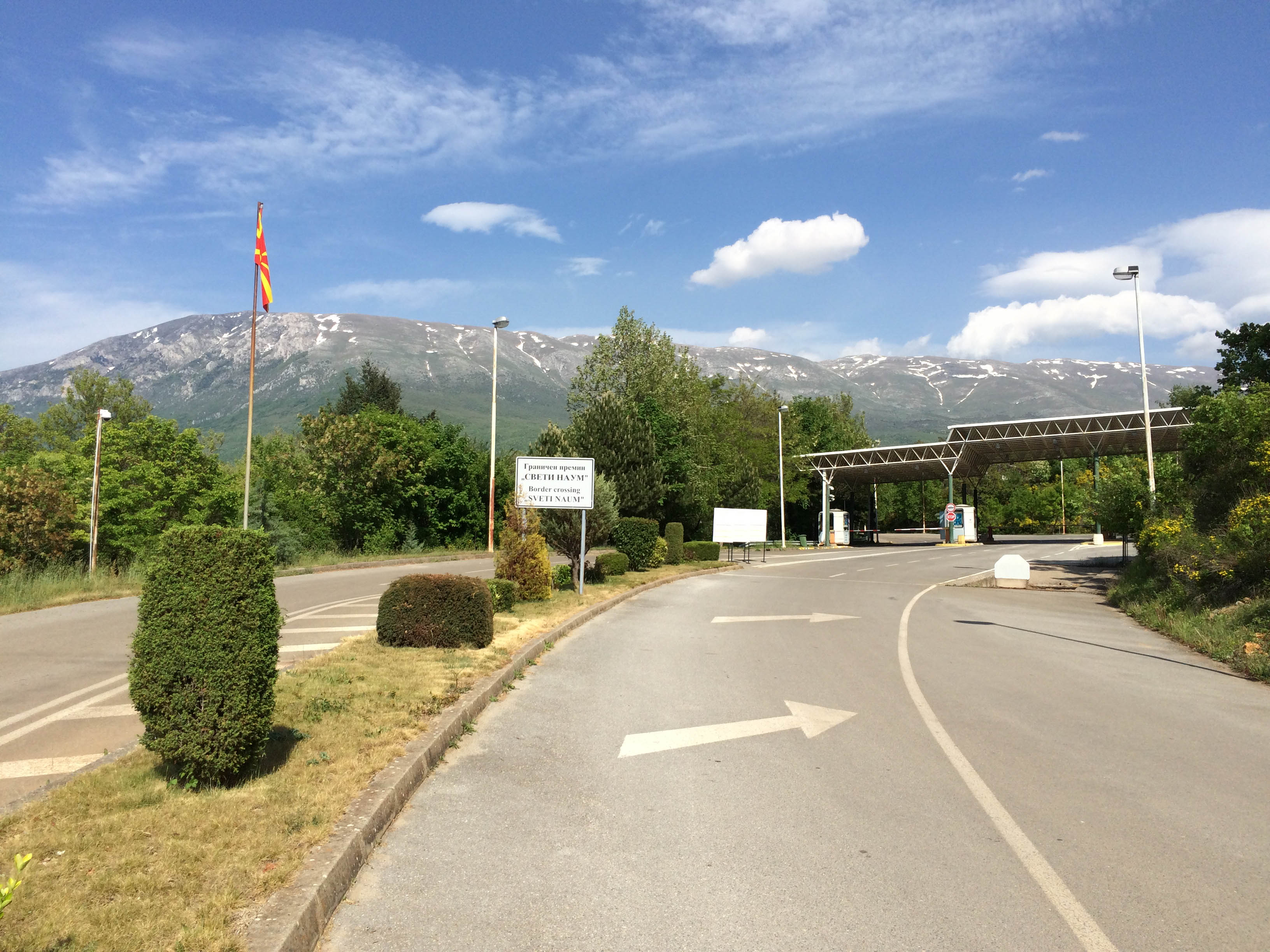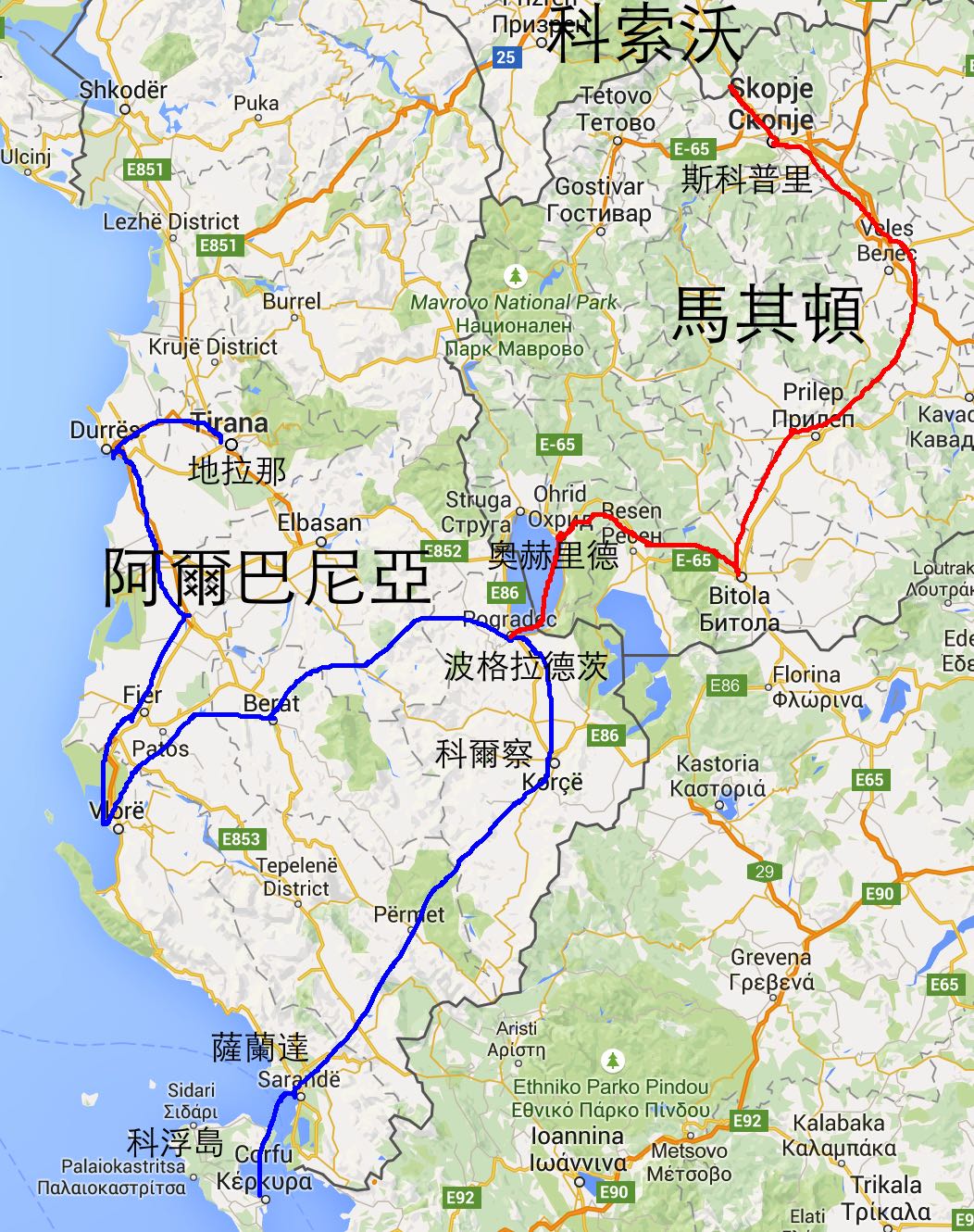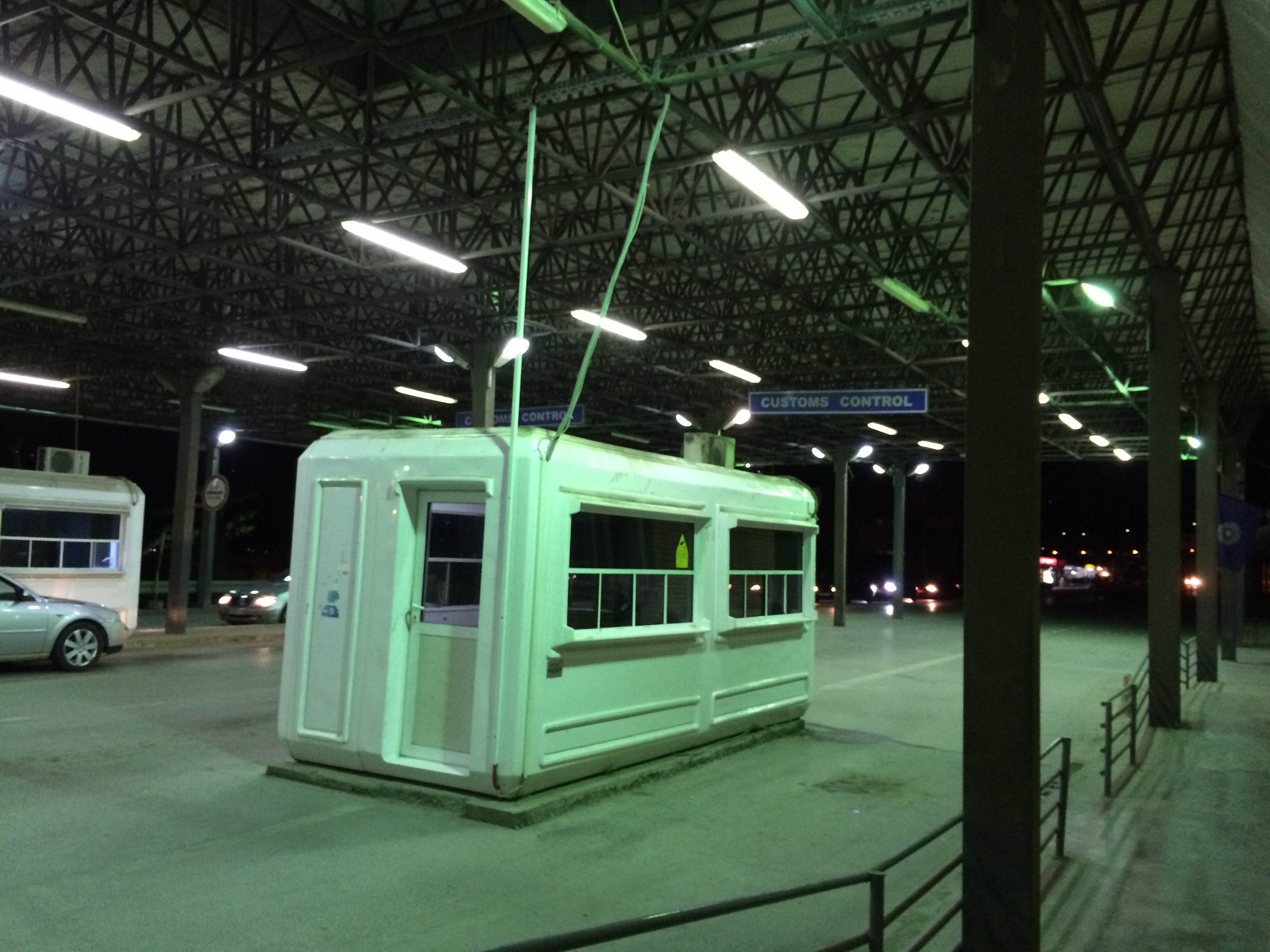Since the birth of the European Union and the “Schengen Area”, multi-country travel in Europe has become extremely simple. However, the Balkans, known as the “Powder Keg of Europe”, are not like this. From 1991, Yugoslavia began to disintegrate, and up until 2008, the Balkan Peninsula experienced wars both large and small. Yugoslavia, once twisted into a single rope by the political strongman Tito, completely fell apart. The split countries established checkpoints along their borders one after another, and the transnational railways and buses that once existed either stopped running or were drastically reduced. For tourists, crossing borders between these various countries has become a difficult problem. Fortunately, these countries all hope to join the European Union and the Schengen Area, so they have successively adopted some degree of recognition for Schengen visas. But exactly to what degree? Each country has its own policy, and they are constantly changing; sometimes even border officials are not necessarily clear on them. I encountered just such a situation on my trip to Macedonia and was directly repatriated to Switzerland.
“Successfully” Entering Macedonia
Originally, my travel plan focused mainly on Albania, entering Saranda from the Greek island of Corfu, and then flying out from the capital, Tirana. When I left the southeastern Albanian city of Korçë (Korca), passing through the small town of Pogradec on the edge of Lake Ohrid, I discovered that Lake Ohrid was incredibly beautiful. It is said that the city of Ohrid (Ohrid/Охрид) across the lake is not only even more beautiful but was also the capital of the First Bulgarian Empire, so I had an impulse to go and explore. As far as I knew, since November 2014, all countries in the Balkan Peninsula had waived visas for holders of multiple-entry Schengen visas, and Macedonia was among them. Since I have a Swiss residence permit, I assumed I could go directly (events later proved me wrong), so I found a minibus heading to the border town of Tushemisht. The driver took me to the border crossing (for only 150 Lek, equivalent to 1.1 Swiss Francs).
The Albanian checkpoint is on a cliff by the lake, guarding a vital communication line; it is definitely easy to defend and hard to attack. When I walked in front of the checkpoint, I met a taxi driver who asked if I wanted to go to the Monastery of Saint Naum in Macedonia. I had intended to do so, but after looking at the map and finding it seemed very close, I refused and decided to cross the border on foot. The Albanian border officer looked at my passport and asked where I was going. I said Ohrid, and he stamped my exit. After exiting, I had to walk a stretch of road to enter Macedonia, which counts as a buffer zone between the two countries. After walking about 1 kilometer, I saw the Macedonian checkpoint. The border official looked at my passport and Swiss residence permit and stamped my entry. It was surprisingly smooth; I didn’t expect this to be the beginning of later troubles.
After entering Macedonia, I first went to the Monastery of Saint Naum (Sveti Naum/Свети Наум) by the lake. This stretch was at least a 3-kilometer walk, and it was all paved highway with no pedestrians in sight; had I known, I would have taken a taxi. Afterward, I took a boat to the city of Ohrid, took a bus to Bitola (Bitola/Битола) the next day, then went to Skopje (Skopje/Скопје), and finally, on a whim, wanted to go to Kosovo. I was eventually repatriated at the border between Macedonia and Kosovo.
As shown in the map, blue is the original planned route, and red is the actual route.
An Impulsive Trip to Kosovo
On the evening of May 15th, I had just finished exploring Skopje and was thinking about my next destination. Originally, I planned to take a bus back to Albania because I eventually had to fly back to Zurich from Tirana. However, I discovered that the distance between Skopje and Pristina, the capital of Kosovo, was only 88 kilometers. So, I bought a bus ticket on the spot (320 Denar, equivalent to 5.5 Euros). This way, I could arrive in Pristina that night, then return to Tirana via the ancient city of Prizren. The time spent on the road would be about the same as going directly from Skopje to Tirana. The more I thought about it, the more I felt my arrangement was seamless: fully utilizing my time, not backtracking, and getting to visit an extra ancient city. Truly brilliant (haha).
Since Kosovo is not a universally recognized independent country, I first checked their entry policy on Kosovo’s Ministry of Foreign Affairs website and confirmed that entry is allowed with a Schengen residence permit before buying the bus ticket.
Blocked at Exit
Since it was the 9:30 PM bus, there were only three passengers on board. Besides me, there was one Macedonian and one Kosovar. Not long after boarding in Skopje, we arrived at the border crossing. When exiting, we handed our passports out together, thinking we’d get a stamp and go. Unexpectedly, an accident happened. The border official flipped through my passport again and again, asking where my Macedonian visa was. I was stunned and told him I had a Swiss residence permit. He took my passport and residence permit away to find a superior for verification while I waited on the bus. A while later, several police officers came and told me to get off the bus with all my belongings and wait inside the small hut next to the checkpoint. I saw the police looking carefully at my passport and Swiss residence permit with a UV light and a magnifying glass, as if they could spot a fake, muttering “problem” under their breath. I felt a bit uneasy in my heart; was I in big trouble?
At this moment, a police officer who understood English finally spoke. He told me there was a problem with my entry into Macedonia. I immediately denied it, saying I have a Schengen residence permit and can enter visa-free, and furthermore, I had an entry stamp when I entered, so how could there be a problem? He told me, yes, but my residence permit is not a permanent residence card. He opened the Macedonian Ministry of Foreign Affairs website for me to see. It turns out Macedonia is an oddity; it only recognizes multiple-entry Type C Schengen visas and Permanent Resident cards. What I possess is a Swiss residence permit with an expiration date, so I cannot enter. I thought I was done for; would they arrest me on the spot for illegal entry? I pretended to have a sudden realization of innocence and told him that if that’s the case, I shouldn’t have been able to enter Macedonia. He said indeed I cannot enter; it was a mistake by the border officer at the other checkpoint.
Falling Short at the Last Step
Meanwhile, he let the bus I was on leave. I thought now I’m in big trouble; leaving won’t be easy either. But since it wasn’t my mistake, they should let me go, right? I’m exiting anyway. Even if I have to hitchhike after crossing, that’s fine. They discussed for a long time and said let me wait a bit first; they would call the Kosovo border to ask. They talked on the phone for ages without making it clear, so the police decided to take me to the Kosovo border to ask. At this point, I felt a glimmer of hope because I had previously checked the Kosovo Ministry of Foreign Affairs website, which clearly stated that one can enter Kosovo with a Schengen residence permit, regardless of whether it is permanent residency or not. After being taken to the Kosovo border, the police made me wait outside the door. After a long time, the Kosovo police’s conclusion was actually entry denied! I wanted to show him what was written on the Ministry of Foreign Affairs website, but I suffered from having no internet on my phone and no paper copy. The police officer’s English level was limited, and I didn’t know if he didn’t understand me or just didn’t want to let me use their computer. So, I was taken back to the Macedonian border by the Macedonian police. Truly falling short at the last step; if only I had printed out Kosovo’s entry policy beforehand, perhaps it would have been fine.
Albania? Serbia? Greece?
After returning to the Macedonian border, the police made me sit aside and wait. Meanwhile, another armed police officer took my backpack for inspection. One officer came over and suggested I take a bus back to the checkpoint where I entered to go to Albania, but another officer said no. What if there’s a problem again? This time Kosovo refused my entry; there’s no guarantee Albania would let me in, even though I came from Albania. Moreover, the Albanian border is hundreds of kilometers away. If let me go on my own, how could they guarantee I wouldn’t continue to stay in Macedonia? I looked at the map and said it’s very close to the Serbian border here; otherwise, let me go to Serbia, I can definitely enter. The police officer smiled and said I was simply crazy. Didn’t I know that going from Skopje to Serbia requires passing through a place called Kumanovo (Kumanovo/Куманово)? Kumanovo had been occupied by Islamic extremists. There were reports they are part of ISIS. A few days ago, a gun battle with police occurred, causing 22 deaths. The current situation is extremely tense. I said in that case, why not go to Greece? As a Schengen area, I can definitely go. The police officer got impatient, saying the Greek border is also very far. Thinking about the terrible relations between Greece and Macedonia, it would likely be difficult.
Final Repatriation
At this time, several more police officers arrived. They discussed together in Macedonian for a long time and finally reached a conclusion: Immediately buy a flight ticket back to China! Hearing this, I almost exploded with anger. This was absolutely unacceptable to me. Besides, Macedonia has no direct flights to China; buying a transfer ticket immediately would cost over 10,000 RMB. So I said I had no money and the ticket was too expensive. They thought about it and felt it was unreasonable too. Seeing I had a Swiss residence permit, they decided to repatriate me to Switzerland. They confirmed there was a flight to Basel at 6:00 AM. It was midnight then, just enough time. The ticket price was around 350 Swiss Francs (about 2000 RMB). Although much better than being repatriated to China, this was not the result I wanted. I thought since I had a ticket from Ljubljana, Slovenia to Zurich, could I just buy a ticket from Skopje to Ljubljana? It would be much cheaper. The police flatly rejected it, saying what if Slovenia refuses entry? I said Slovenia is a Schengen country, they absolutely wouldn’t. They threatened saying, this is for your own good, do you want to be arrested? Just as I wanted to deny having money to buy the ticket, they searched my backpack directly, found my wallet and credit card, and immediately bought the Skopje to Basel ticket online using my credit card. Then they made me wait inside the police car. Afterward, an officer came and said he would drive me to the airport to prevent me from escaping. Upon arriving at the airport, I was escorted to exit, stamped out, and only after confirming I could not re-enter was my backpack returned to me. I checked my backpack and found the only 50 Euro banknote inside was taken. The police said this was the fee for driving me to the airport. It really made me furious.
I waited at the airport until five o’clock and was finally able to board. The plane took off on time at six o’clock, and I finally left Macedonia. During the flight, a passenger had a medical episode and lay on the floor unable to move. The plane almost turned back to Skopje. Fortunately, there was a doctor among the passengers who saved him, otherwise, I would have been “repatriated” again.
Because I was repatriated at the border, my direct loss was at least over 600 Swiss Francs, including the new ticket, the original ticket, the “fee” for the ride to the airport, and the non-refundable hotel booking. This doesn’t even count the paid leave I applied for; I originally had a few nice days left to explore, but now that I’ve been sent back to Switzerland, I’m in no mood to go out again. The biggest lesson from this trip is that when entering small countries in the future, one must bring a printed copy of the text written on that country’s Ministry of Foreign Affairs website. If I had brought Kosovo’s entry policy description, my probability of successfully entering Kosovo would have greatly increased, and there would have been no losses caused by forced repatriation. Come to think of it, if I hadn’t been “too smart for my own good” trying to go to Kosovo, but instead returned to Albania the way I came, similar things probably wouldn’t have happened.
Last modified on 2017-03-16



